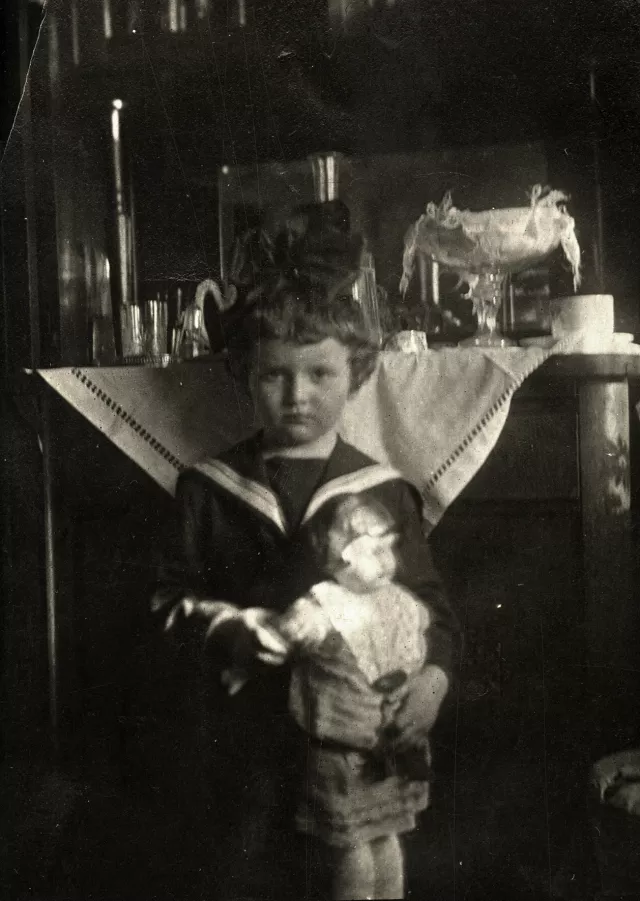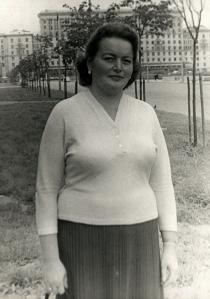Rita Kazhdan on her fourth birthday
This photograph was taken by my father, Abram Fridman in Minsk in 1932 the day I turned four years old. Father photographed me against the background of our old-fashioned sideboard with wood engraving. There was a pink tea set, a 'Kuznetzovsky' on it. [Kuznetzov was a famous pre-revolutionary owner of porcelain works.] It was of magnificent beauty, a superfine one. The doll you see in my arms was brought for me from Leningrad by my paternal grandpa Shimon Fridman.
I was born in 1929 in Minsk. We lived in a good two-room deluxe flat, which was bought for my parents by grandpa Grigory Vselubsky after their marriage. The flat was heated with firewood. After the reduction of living space per person by the Soviet authorities, before my birth, a Latvian lady was accommodated in my parents' flat. She was a government official and was given one of our rooms. Before this reform, our flat was considered a luxury one because everyone around lived in communal apartments. We had a dining room of 30 square meters and our bedroom was 18 square meters plus a small corridor and a kitchen. We had meals only in the dining room.
I remember going to a private kindergarten, where there was the so-called frebelichka, that is, a governess, who went for a walk with us, played various games in German. Her name was Margarita Robertovna. We spent a lot of time doing needlework. I was taught to embroider and to knit by the housemaid. I embroidered excellently, knitted excellently, and I can still do all these things now. I was dressed very well, in a modern, beautiful fashion.
I was the pet of the family. Granny Sarra , my father's mother, always wore decorations, rings and earrings. I played with the jewelry. Whenever grandfather went abroad on business, he always brought something for my mum. She was a very attractive young woman (of course, before I was born). Grandfather brought all sorts of trinkets for her. And I was keen on her trappings. I was simply keen on them. She had a sack made of the black playing glass beads, and there was a yellow rose or lily on it, or something of this kind, made of beads. And the sack was half-full of that jewelry. Daddy saved them, but when we found ourselves in the ghetto, mum left all these things in the housemaid's charge. We didn't see them again.
In those years [in the 1930s] there were special shops in the USSR, the so-called Torgsin stores. And there, in Minsk - I recall it as if it happened yesterday - there was a huge shop on Lenin Street, where everything was sold for special bonds or currency. One could obtain these bonds in exchange for gold or silver, mostly silver. We had a lot of silver things in our family. Maybe father's salary was insufficient because, you see, mum didn't work, and the best goods were sold in Torgsin stores. So mum made use of our valuables exchanging expensive stuff - spoons, silver forks, heavy silver things - for currency from time to time. This way she was able to buy everything we needed. We were well-provided for, we lived comfortably. Mum didn't wear the jewelry she had, because it was considered indulgent. One should go through all of it and see it with one's own eyes, because however hard I'm trying to explain this to you, if you hadn't experienced all that, your idea of that period will certainly be incomplete.
Unfortunately we didn't observe Rosh Hashanah or Sabbath. People used to gather at our home on Saturday or Friday, it was a 'visiting day', one might say. The parents had polite conversations. Mother always played the piano very well, sang well; so we always had good company. There was never any vodka on the table, only at the New Year Party. We just had tea parties. Tea, cakes. I don't remember going to the synagogue. Only after the war did I learn where it was situated.










